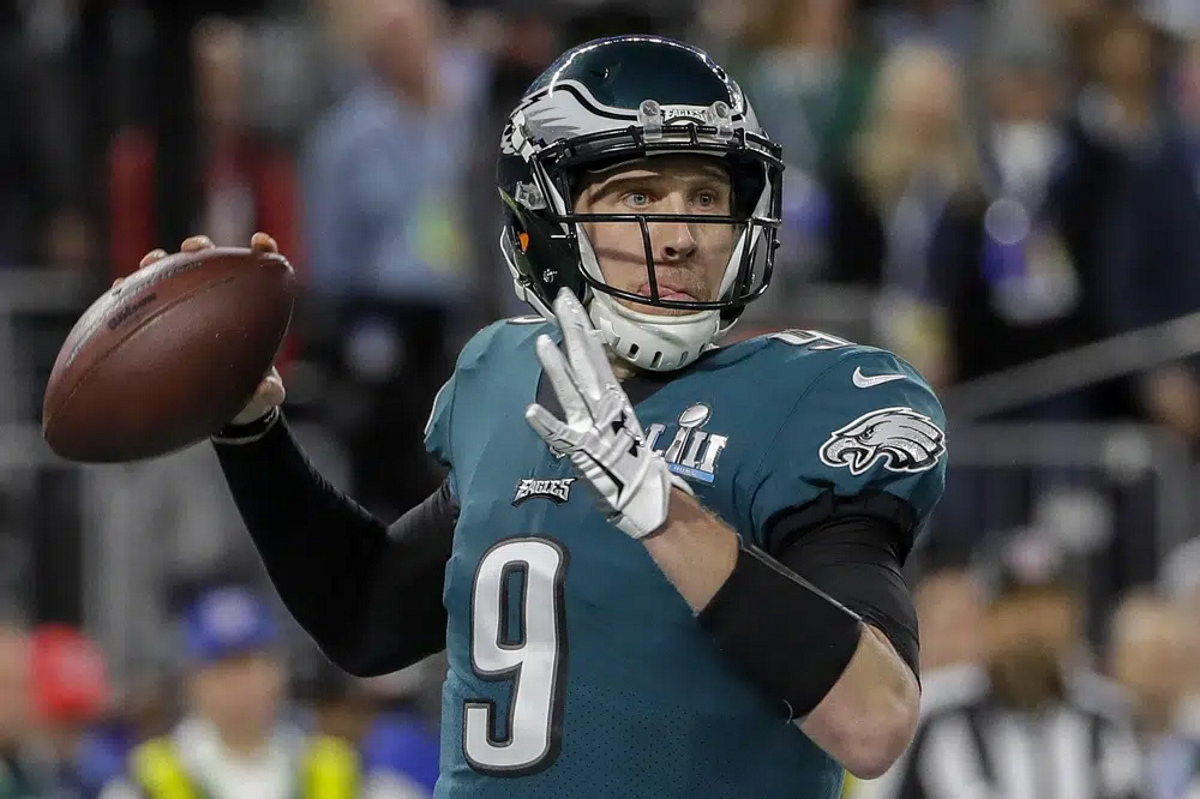By Josh Dubow
Brock Purdy’s bid to join the select group of quarterbacks to go from a backup for most of the season to a Super Bowl starter got derailed when he suffered his own injury in the NFC championship game.
Purdy’s elbow injury helped contribute to San Francisco’s 31-7 loss to the Philadelphia Eagles that set the stage for a Super Bowl matchup of first and second team All-Pro quarterbacks Patrick Mahomes and Jalen Hurts instead of another improbable story.
There have been several examples of backups leading a team to the big game with the most recent coming in the 2017 season when Nick Foles took over in Philadelphia for the final three games of the regular season after Carson Wentz got hurt.
Foles struggled at first before a storybook finish, becoming the only QB ever to throw for at least 350 yards and three TDs in the conference title game and Super Bowl in the same season to outduel Tom Brady for the championship with a 41-33 win.
“I wasn’t worrying about the scoreboard, I wasn’t worrying about the time, I was just playing ball,” Foles said after that game. “I think sometimes you start worrying about that too much, it starts creeping in your brain. I was just playing.”
Foles was the 14th quarterback to start the Super Bowl after not holding that role for the season opener, including Brady (2016) and Ben Roethlisberger (2010), who were suspended to start those seasons. The others fall into a few categories.
FILE – New York Giants quarterback Jeff Hostetler (15) celebrates a second quarter touchdown against the Buffalo Bills during Super Bowl XXV in Tampa, Fla., in this Jan. 27, 1991 photo. (AP Photo, File)
There were those who seized the job early in the season such as Jake Delhomme did for Carolina when he replaced Rodney Peete at halftime of the 2003 season opener; Brady when he stepped in for an injured Drew Bledsoe in Week 3 in 2001; and Joe Kapp, who replaced Gary Cuozzo for Minnesota in the second game in 1969.
Then there were teams looking for a midseason jolt that turned into Super Bowl wins. Roger Staubach shared time with Craig Morton in 1971 before taking over for good midway through the year to launch a Hall of Fame career with his first Super Bowl win.
Three years later, Terry Bradshaw began the season on the bench behind Joe Gilliam before taking over as starter in Week 7, then winning the first of four Super Bowl titles. Trent Dilfer then stepped in for Tony Banks midway through the 2000 season for Baltimore, lost his first start and then won 11 in a row behind a dominant defense.
There were two other cases of injuries leading to changes before the stretch run, with Jim Plunkett stepping in for Dan Pastorini in 1980 in Oakland; and Colin Kaepernick doing the same in San Francisco after Alex Smith had a concussion in 2012.
Purdy was trying to join the group to make the Super Bowl after starting five or fewer games in the regular season alongside the Rams’ Vince Ferragamo (1979), Washington’s Doug Williams (1987), the Giants’ Jeff Hostetler (1990) and Foles (2017).
Hostetler had started just two games in almost seven full seasons for the Giants when Phil Simms injured his foot in Week 14. After starting that season with 10 straight wins, the Giants lost three out of four and were mostly written off as a contender when Simms got hurt.
“Everyone had jumped off the bandwagon,” Hostetler recalled in 2018. “We were completely shot as a team. That was the outside looking in. Inside where we were at, we just rallied the wagons. It was us versus the world. We just rallied around each other and it showed.”
When he stepped in for Simms in December, Hostetler had thrown 93 passes since entering the NFL in 1984. Hostetler managed to lead the Giants to two wins to end the regular season, a lopsided playoff opener over Chicago, then upsets over two-time defending champion San Francisco in the NFC title game (15-13 on five field goals) and Buffalo (20-19) in the Super Bowl.
Williams had much more experience when he made his playoff run, having started 67 games for Tampa Bay before going to the USFL.
FILE – In this Jan. 31, 1988, file photo, Washington Redskins quarterback Doug Williams prepares to let go of a pass during first quarter of Super Bowl XXII against the Denver Broncos in San Diego. (AP Photo/Elise Amendola, File)
He returned to the NFL in 1986 and started only two games for Washington when Joe Gibbs made the switch midway through the final regular season game because Jay Schroeder had been struggling because of a lingering shoulder injury.
“I never was a backup, so the mentality was a lot different,” Williams recalled in 2018. “Even coming to Washington as the backup, I had a backup position with a starter’s mentality. That’s how I always looked at it.”
Williams played that way in the postseason. He helped overcome a 14-point deficit in wind chill of minus-20 degrees in Chicago against the mighty Bears defense in the division round before throwing two TDs to beat the Vikings again at home in the NFC title game.
Williams then put together an historic performance in the Super Bowl, leading five TD drives in 18 plays in the second quarter of a 42-10 win over Denver in San Diego. Williams threw for 340 yards and four TD passes on a gimpy knee to win MVP honors.

